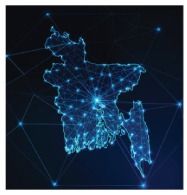![]() Admin
Admin
![]() September 24, 2025
September 24, 2025
![]() (0) Comment
(0) Comment

![]() Admin
Admin
![]() September 24, 2025
September 24, 2025
![]() (0) Comment
(0) Comment
How Bangladesh can build on global lessons, homegrown innovation, and cross-border linkages to create a truly inclusive digital economy.
Having spent decades working in banking across India and Bangladesh, I have witnessed firsthand the transformative power of digital finance. From established financial hubs to emerging markets, the trend is clear: digitization is no longer a choice but a strategic imperative for financial inclusion and economic growth. Bangladesh stands at a pivotal moment, poised to join the ranks of economies reshaped by cashless innovation. Drawing from global experiences and Bangladesh's own digital progress, let us explore how we can accelerate this journey pragmatically and purposefully.

The Global Digital Playbook
Digital finance across the world has rewritten how people transact, save, and grow businesses. Bangladesh can learn valuable lessons from diverse economies-both advanced and developing.
• India's UPI Revolution: India's Unified Payments Interface (UPI) has become a global benchmark with over 14 billion monthly transactions. The recent introduction of Conversational Voice Payments-leveraging voice recognition, natural language processing, and Al-driven assistants-is a transformative leap. It enables users to initiate and authorize payments simply by speaking in multiple Indian languages, making digital transactions accessible to all, including those with limited literacy, visual impairments, or minimal smartphone experience. For instance, a user can complete a secure transaction by saying, "Pay 500 to Maksud via Google Pay," without typing or navigating menus. This human-centric, inclusive innovation has bridged language and digital literacy gaps, especially benefiting rural and semi-urban areas.
• Kenya's M-Pesa Miracle: In a country with limited banking infrastructure, M-Pesa became a lifeline. Remarkably, 96% of households use mobile money for remittances, bill payments, and microloans. Its "Dollar One" model proves small-value digital transactions can drive massive financial inclusion.
• Hong Kong's Octopus Card: Starting as a transit card, it expanded to retail and daily commerce, embedding payments in everyday life and driving adoption through universal acceptance.
• Singapore's Smart Nation: Singapore built a cash-lite society by ensuring interoperability through PayNow and integrating digital ID with payment systems. Government leadership, merchant incentives, and security guarantees created trust and scale.
• Nigeria's Cashless Challenge: Despite robust technology, adoption fell short due to unreliable internet, limited awareness, and trust issues-reminding us digital finance only succeeds when it is easier and safer than cash.
 Bangladesh's Steady Digital Momentum
Bangladesh's Steady Digital Momentum
The foundation is strong. Bangladesh Bank has championed initiatives like Bangla QR, an interoperable QR code unifying banks and mobile financial services (MFS). Household names like bKash have enabled millions, especially in rural areas, to adopt digital payments and receive remittances.
Government disbursements, including social safety nets and pensions, increasingly route digitally signaling institutional commitment. Yet cash dominates routine transactions. Many small businesses and informal workers prefer cash due to habit, low literacy, and concerns over digital reliability.
For business leaders and bankers, these realities present both a challenge and an opportunity: technological rollout must be paired with behavioral change.
Bangla QR: Promise and Pushbacks
Bangla QR holds transformative promise as Bangladesh's interoperable payment backbone, echoing successes of UPI and PayNow. However, adoption remains uneven.
• Merchant reluctance springs from perceived low incentives and fears over fees or payout delays.
• Limited consumer awareness keeps many from unlocking Bangla QR's interoperability via existing wallet apps.
• Bank caution arises from worries that QR payments may cannibalize lucrative card revenues.
• Dominant wallets like bKash and Nagad overshadow interoperability in consumer perceptions.
Addressing these challenges demands coordinated efforts: stronger merchant incentives, widespread consumer education, transparent fee structures, and regulatory encouragement for bank-wallet collaboration to unlock true ecosystem value.
Cross-Border Opportunity: Beyond Traditional Remittances
Remittances are Bangladesh's economic lifeline. Currently, overseas workers send money to wallets via MTOS such as Western Union, a process that remains costly, slow, and reliant on cash-outs.
The next leap is direct wallet-to-wallet integration and international QR interoperability:
1. Direct Global Wallet Integration: Migrant workers could send money directly from platforms like PayPal, Wise, Google Pay, or UAE wallets into Bangla QR-enabled accounts. This would reduce costs and enable real-time settlements.
2. Cross-Border QR Linkages: Just as Singapore's PayNow connects with Thailand's PromptPay, Bangla QR could link with GCC or ASEAN payment systems, enabling instant remittances via QR
scans.
3. Value-Added Services: Remittances could directly fuel savings, bill payments, or micro loans- turning inflows into empowerment tools rather than mere cash-outs.
Building Blocks for a Cashless Bangladesh
Drawing from international experience and local context, the pathway forward includes:
• Simplicity and Inclusion: Digital finance products must feature Bangla-language interfaces, voice-enabled options, and transparent fees to build trust across demographics.
• Rural Digitization: Subsidized QR codes and affordable point-of-sale devices are vital to reaching farmers, artisans, and small traders.
• Public-Private Collaboration: A nationwide "Cashless Bangladesh" campaign, led by Bangladesh Bank, commercial banks, fintechs, and telecoms, can create momentum and scale.
• Savings and Credit Linkages: Integrating payments with micro-savings, credit, and insurance products-akin to Kenya's $1 savings model-promotes financial resilience and deeper inclusion.
• Financial Literacy and Trust: Partnerships with schools, NGOs, community leaders, and robust fraud prevention efforts are critical to nurturing informed, secure users.
Strategic Importance for Business and Banking Sectors
For business leaders and bankers, embracing cashless systems is strategic, not just regulatory.
Digital finance cuts operational costs, reduces leakages, and creates transparent transaction records, strengthening SMEs' creditworthiness and access to formal financing.
Exporters and retailers improve their global competitiveness through enhanced traceability and operational efficiency.
Cashless adoption empowers organizations to thrive in the digital global economy.
A Call to Action for Synergistic Leadership
Achieving a truly cashless Bangladesh requires collaborative action:
• Bangladesh Bank should further accelerate interoperability, clarify regulations, and lead cross- border wallet-to-wallet remittance channels.
• Commercial Banks should promote Bangla QR, incentivize merchants, and build global remittance partnerships.
• Fintechs and MFS Providers (bKash, Nagad, Rocket) need to deepen rural penetration and align with global payment ecosystems.
• Telecom Providers must guarantee affordable data and USSD access for non-smartphone users.
• Merchants and SMEs should adopt digital payments to lower costs and build financial credibility.
• Industry Leaders and Investors must foster integrated domestic and international payment ecosystems.
• Expatriates and Consumers are encouraged to shift to wallet-based remittances and digital daily payments-starting with bills, transport, and groceries.
Conclusion: Towards a Digitally Empowered Bangladesh
Bangladesh possesses critical enablers-a digitally savvy youth, widespread mobile connectivity, trusted wallets with global reach, and a visionary central bank.
The next phase hinges on synergy: enabling Bangla QR interoperability, expanding rural infrastructure, improving literacy, and pioneering cross-border digital linkages.
Digital finance is more than technology-it catalyzes trust, inclusion, and empowerment.
Embracing this cashless revolution can redefine economic participation for all citizens-from rickshaw pullers in Dhaka to migrant workers in Dubai supporting their families.
The responsibility lies with us-bankers, business leaders, policymakers, and consumers-to turn promise into reality and lead Bangladesh confidently into its cashless future.